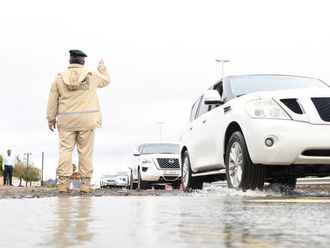Kuwait is celebrating its 57th independence anniversary, which coincides with the country’s 27th liberation anniversary from the wanton Iraqi occupation. For too long, the country has been an exception and a pioneer in the region. It was the first country among the littoral Gulf states to gain full independence from Britain and regained its full sovereignty back in 1961, ten years before other Gulf Cooperation Council (GCC) member-states gained their independence. This gave Kuwait a head-start and allowed it to play the role of the mentor and donor country, helping and assisting other Gulf states in their drive for full independence. Kuwait moved quickly to institutionalise its infant system by electing a constitutional Assembly to draft the first constitution in the Gulf (in 1962), followed by adopting the first written constitution among Gulf states and holding the first election to elect a 50-member National Assembly (in 1963). Kuwait’s Constitution and parliament were the blueprint for other GCC states, such as Bahrain, when it decided to draft a constitution and elect a National Assembly in the early 1970s. But it did not last for too long.
Over 55 years, 15 parliaments have been elected in Kuwait, but like all emerging democracies, Kuwait’s democracy has witnessed its ups and downs. After 55 years of political participation and elections, Kuwait’s parliament continues to be the only fully elected body in the region, and the only parliament that has been able to grill and interpolate senior members of Kuwait’s ruling family, including the prime ministers and ministers from the Al Sabah family. Actually, Kuwaiti MPs have carried out more than 80 interpellations and toppled the cabinet a dozen times, which led in one way or the other to the shutting down and dissolution of parliament by Emiri decrees or court orders (due to irregularities) nine times. This proves the dynamism and activism of the Kuwaiti parliament.
Kuwait led the GCC states in terms of several soft-power areas, too. In politics and strategic thinking, Kuwait, along with the UAE, back in the mid-1070s, thought of forming a Gulf alliance that would lead to the formation of the GCC in 1981 — 20 years after Kuwait’s independence and ten years after all other GCC members’ independence (with the exception of Saudi Arabia).
Since its early days of independence, Kuwait launched a ‘Fund for Arab Economic Development’. Since then, the country has given out close to 1,000 soft loans to more than 106 countries all over the world, totalling more than $20 billion (Dh73.56 billion). “Kuwait Fund for Arab Economic Development” model was later adopted by other GCC states.
In sports, Kuwait has won a record ten championships in the Gulf Cup tournament. It is the first state to win the Asian Cup and the first GCC state to qualify for the football World Cup in 1982. These are just a few of its accomplishments. The country scores high in areas of entertainment, theatre, TV sitcoms, it can boast of reasonable press freedom and the freewheeling Diwayniyah — the Hyde Park-style all-male gathering where no subject is off limits for discussion. Many GCC officials have obtained their college education from Kuwait University — the first university in the GCC, which opened its doors in 1966. Kuwait’s pioneering publications, even before its full independence, such as AlArabi monthly magazine with its sleek and high-quality paper and affordable price, was a household name all over the Arab world and put Kuwait on the map as one of the leading Arab countries spreading knowledge and informing Arabs about their own world, cities and culture, before the age of TV and satellite feed.
Kuwait’s soft power has not waned, even after the Iraqi aggression and occupation in 1990-1991. The country has played a major role in fine-tuning its skills in mediation diplomacy, attempting to resolve many Arab disputes, in addition to lending a helping hand to other Muslim and developing countries all over the world.
As the mayhem and disorder in the Middle East grinds on with all its tumultuous flashpoints, wars and conflicts, Kuwait seems to be perfecting what is has been doing for more than half a century. It hosted the first Arab Summit in 2009, dedicated to social, economic and other development issues and not just politics. Kuwait hosted the Arab-Asian and Arab-African summits and held three international humanitarian conferences for Syria between 2013-2015 — pledging more than $8 billion. Kuwait’s contribution topped at $1.3 billion, making it along with the US, the largest donors to help the Syrian people.
Lately, Kuwait’s soft power has been on display again. The country has been a leading mediator in the GCC crisis between Qatar on one hand and the anti-terror quartet of Saudi Arabia, UAE, Egypt and Bahrain on the other, trying to mediate the vexing issue and doing its best to resolve it since it impacts the future of GCC solidarity.
Kuwait, as the victim of Iraq’s aggression and occupation, was praised by the United Nations and many world bodies for overcoming the trauma and the scars of the occupation and for hosting the conference for rebuilding Iraq — (KICRI), between February 12-14. Iraqi Prime Minister Haidar Al Abadi hailed the conference as a “resounding success”. KICRI netted Iraq $30 billion in aid pledges, led by Kuwait, which has committed $2 billion in soft loans under the supervision of Kuwait Fund for Arab Economic Development, and another $1 billion in long-term investments.
As Kuwait celebrates its 27th liberation and 57th independence anniversaries, it reflects more than six decades of development. The country looks at its liberation, with much confidence, satisfaction and contentment, as it continues to grow in stature as a successful role model and a harbinger for others to emulate.
Abdullah Al Shayji is a professor of Political Science and the former chairman of the Political Science Department, Kuwait University. You can follow him on Twitter at www.twitter.com/@docshayji.










